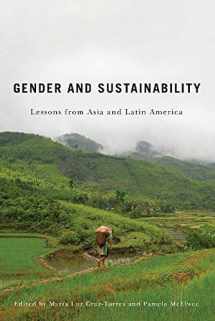
Gender and Sustainability: Lessons from Asia and Latin America
Book details
Summary
Description
This is one of the first books to address how gender plays a role in helping to achieve the sustainable use of natural resources. The contributions collected here deal with the struggles of women and men to negotiate such forces as global environmental change, economic development pressures, discrimination and stereotyping about the roles of women and men, and diminishing access to natural resources—not in the abstract but in everyday life. Contributors are concerned with the lived complexities of the relationship between gender and sustainability.
Bringing together case studies from Asia and Latin America, this valuable collection adds new knowledge to our understanding of the interplay between local and global processes. Organized broadly by three major issues—forests, water, and fisheries—the scholarship ranges widely: the gender dimensions of the illegal trade in wildlife in Vietnam; women and development issues along the Ganges River; the role of gender in sustainable fishing in the Philippines; women’s inclusion in community forestry in India; gender-based confrontations and resistance in Mexican fisheries; environmentalism and gender in Ecuador; and women’s roles in managing water scarcity in Bolivia and addressing sustainability in shrimp farming in the Mekong Delta.
Together these chapters show why gender issues are important for understanding how communities and populations deal daily with the challenges of globalization and environmental change. Through their rich ethnographic research, the contributors demonstrate that gender analysis offers useful insights into how a more sustainable world can be negotiated—one household and one community at a time.
Contributors
Stephanie Buechler
María Luz Cruz-Torres
Linda D’Amico
Georgina Drew
James Eder
Lisa L. Gezon
Pamela McElwee
Neera Singh
Hong Anh Vu
Amber Wutich


We would LOVE it if you could help us and other readers by reviewing the book
Book review



